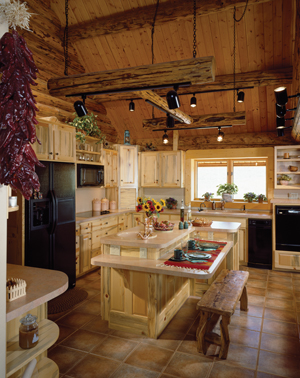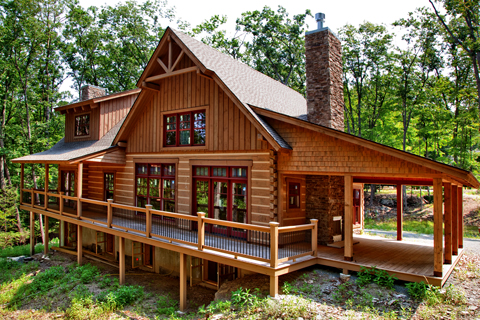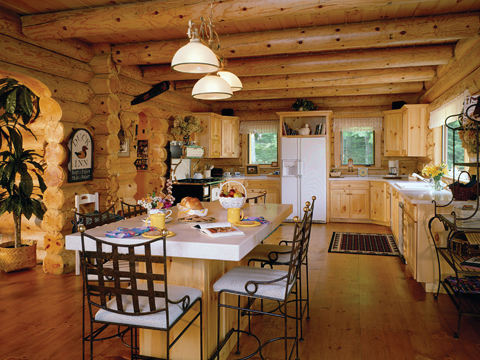When Wes and Chris Spiker decided to build a log home on their property in Missoula, Montana, they knew they wanted a company that would respect their needs and not just offer limited options. “We were looking for architects that would work as a team with us and listen to us about what we wanted,” says Chris Spiker. The couple ended up choosing Rocky Mountain Log Homes not only because they were willing to work with the Spikers on their own home design, but because they were known as a reliable company. Seventeen years later, the Spikers are still in love with their 3,300-square-foot home in Missoula. “It was a very good experience,” says Chris Spiker. “If we had an issue with something it was taken care of right away!”
Deciding to build a home is one of the biggest decisions most people will make in a lifetime. Naturally, it opens the doors to many more decisions—about design, materials, and décor, but perhaps most importantly about which log home producer to choose.
There are so many choices out there and so many things to consider when selecting a log home producer that it’s hard to know where to start! Here are a few things to keep in mind.
Make sure the company itself is well built. We’ve all heard horror stories about a builder starting work, then closing up shop and going out of business before the home is completed—and you don’t want to find yourself in that scenario. Chip Smith, president of Blue Ridge Log Cabins in Spartanburg, South Carolina, notes that in today’s economy a lot of companies in the construction industry are on shaky ground. “In this day and time when construction is so challenged,” Smith says, “you want to inquire about the financial strength of a company.”

Hiawatha Log Homes
Know what is (and isn’t) included in the price. Different companies include different things, so make sure you aren’t comparing apples and oranges when reviewing prices. Some include all the building components, others don’t. Some companies provide adequate building plans, but others may not.
“It’s usually not what is included that will get a homeowner in trouble; it’s what is not included,” says Ehren Graf, national home consultant at Wisconsin Log Homes. If you are not working with a company that can offer turn-key (start-to-finish) services, Graf advises having your materials provider and contractor discuss everything that’s needed for a complete home.
Understand your materials. “Ask what species the logs are and find out whether they are green or dried,” says Mark Moreland of Rocky Mountain Log Homes in Montana. There isn’t one species that is superior to all others, so it’s not a simple question. Different companies have different standards and preferences regarding materials, so it’s a good idea to have an understanding of what’s available and know the pros and cons of what’s offered.
Experience counts. Of course, the materials you choose are only as good as the builders that put them together. “In today’s market you can buy almost all of the material that will go into your home at a building supply company,” says Smith. “What makes it unique is how it’s put together and the craftsmen that do that.” Smith recommends looking for a company that is a member of the Log Homes Council, a national alliance of builders who agree to a strict code of ethics.
Set (and share) a realistic budget. “The hardest thing we find is getting people to share a realistic budget with us,” says Moreland. “If they can give us a realistic number then we can sit down and work together as a team to design a home that can fit the budget. You are going to get a better price in the long run than if you just shop around.”
One practice Moreland recommends is making a chart listing what you’d like to have and what you must have, so that you can find flex room in your budget if necessary. If you are clear about your expectations at the outset, you’re less likely to encounter unwelcome budget surprises later.
Build a good working relationship. Your home isn’t the only thing that needs to be on solid ground: you’re going to spend a lot of time over the coming months working with the company you select, so be sure the representative is someone you feel comfortable with. You should be able to contact them throughout the process, and even after the home is built.
“A company can promise anything, but it is what they deliver that really matters,” says Graf. “It’s also important that you genuinely like and get along with the people you’ll be doing business with…. You’ll be working very closely with them on a regular basis, and getting along with one another makes the process much smoother and more enjoyable.” Graf notes that one of the best parts of the job is getting to know his clients on a personal level. “By learning more about our clients and their families, we’re able to get a better understanding of their dream home needs.”
Get references. If a company stands behind its work, you’ll have no trouble getting references who can tell you about their experiences. “I think it’s important to ask for the names of people who have recently built log homes with that company and are willing to be contacted,” says Moreland. “There are often hiccups when building a house, but it’s nice to know how those situations were handled.”
“Ask for a list of the last five homes the company has built,” says Smith, who notes that companies change over time. “We encourage our customers to become as educated as they can possibly be, but what will be the best indicator is a third-party endorsement.”
Love your mother—Mother Earth, that is. Some timber harvest practices are more environmentally friendly than others, so it pays to ask how the producer you are considering obtains their logs. “We’re losing an acre of rainforest every second,” says Moreland, whose company harvests dead standing timber. “From an environmental standpoint, that’s pretty important.”
Graf agrees that it is important to many people that they work with an environmentally friendly company. “Wisconsin Log Homes takes proper forest management very seriously,” he says. “The log and timber suppliers we partner with follow conscientious harvesting and foresting practices, ensuring a continuous supply of quality trees.”


